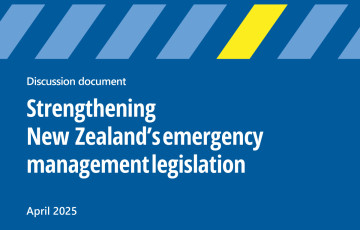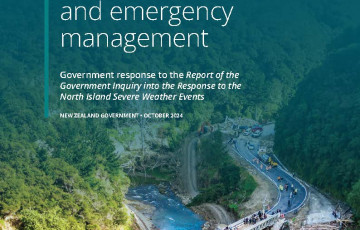Weekly Update from the Cyclone Recovery Unit – 8 May 2023
Update from the Cyclone Recovery Unit
CRU is working alongside the Cyclone Recovery Taskforce and other Government agencies to support the worst affected regions to recover from the impacts of the North Island floods and Cyclone Gabrielle.
This week we have one-page summaries from the Ministry for Primary Industries and the Ministry of Business, Innovation and Employment. You’ll find them attached.
Update from the Task Force
Work continues with councils and insurance companies to confirm confidence levels around the risk status of areas. This is important for decision makers to have confidence in the information as a foundation for community discussions on options to address risks.
The journey ahead remains a team effort. Local and regional councils together with central government, will work closely with communities to ensure their needs and priorities are reflected in the region’s recovery planning. We had hoped to have preliminary information to share by the end of April and are continuing to work with councils and central government to find agreed timeframes as soon as possible.
Different councils are at different stages, but all involved recognise the need to provide certainty as soon as possible – even if that certainty is clarity around what next steps look like. We acknowledge the uncertainty and the impact that this has on people, and also the need to ensure that decisions are carefully thought through, supported by evidence, and informed by community engagement.
As well as locally impacted communities in the Hawke’s Bay and Auckland, the Taskforce is engaging with the banking sector, insurance sector, and infrastructure in order to ensure local, iwi, and business voices have input into decision making, and to align the economic and infrastructure recovery efforts.
New this week
Support for silt and debris removal in Hawke’s Bay and Tairāwhiti
This week it was announced that $102 million has been allocated to help councils process and dispose of all the debris coming from residential properties, and to deal with sediment on council-land to make it available to the public again.
There is also $70 million for commercial properties (including farmers and growers) to help clean up their land and return to profit, and there is funding for debris and sediment removal from whenua Māori
This latest funding will help councils manage the cost of the post cyclone clean-up. This includes collection, processing, removal, and disposal of sediment and debris, it’s estimated there’s 700,000 cubic metres of sediment needs to be cleared.
Based on official advice, within the funding for councils and commercial properties, $133.2 million has been allocated for Hawke’s Bay and $38.8 million for Tairāwhiti.
Read the full release here
Support for Māori
Te Puni Kōkiri is distributing $9m of the $15m allocated to support Māori recover from Cyclone Gabrielle through the Cyclone Gabrielle Māori Communities Response Fund providing:
- Capacity support such as relief staffing, clean-up expenses, generators and communication equipment
- Recovery planning and co-ordination funds
- Marae infrastructure and support funds such as securing temporary storage for taonga and food.
At the end of April 2023, $7.84m has been committed, is being processed or is under discussion across affected regions of Ikaroā-Rāwhiti – Takitimu, Ikaroā-Rāwhiti – Tairāwhiti, Te Tai Tokerau, Tāmaki-Makarau and Waikato-Waiariki.
Te Puni Kōkiri kaimahi are also helping whānau identify and connect into other recovery focused government funds. The Ministry has an important role in times like these, to support other agencies to understand and reflect the needs of whānau Māori in their recovery approaches.
For enquiries about Te Puni Kōkiri funding in cyclone affected regions contact a Te Puni Kōkiri regional office.
Recent Announcements
Property categorisation
The Cyclone Recovery Minister has outlined the three categorisations of property in areas affected by the severe weather events earlier this year.
Three categories have been settled on under which the future of flood and landslide affected properties will be assessed.
Communities will be consulted before any final decisions are made about which category properties are placed into, those discussions will begin as soon as assessments are completed and quality assurance is done.
Read the full release here
Initial risk categories and definitions:
|
Category |
Definitions |
Examples |
|---|---|---|
|
1 |
Repair to previous state is all that is required to manage future severe weather event risk. |
Minor flood damage to repair but no need for significant redesign/retrofitting. |
|
2C |
Community level interventions are effective in managing future severe weather event risk. |
Local government repairs and enhances flood protection schemes to adequately manage the risk of future flooding events in the face of climate change effects. |
|
2P |
Property level interventions are needed to manage future severe weather event risk, including in tandem with community level interventions. |
Property specific measures are necessary e.g., improved drainage, raising houses is necessary. Benefits accrue to property owners but some may face affordability issues. |
|
2A |
Potential to fall within 2C/2P but significant further assessment required. |
Interventions may be required / possible but insufficient information to provide initial categorisation (these may subsequently move between "2" categories or to categories 1 / 3). |
|
3 |
Future severe weather event risk cannot be sufficiently mitigated. In some cases some current land uses may remain acceptable, while for others there is an intolerable risk of injury or death. |
In the face of enhanced climate risks the property may face unacceptable risk of future flooding. Other property could be subject to unstable land that poses an ongoing risk. |
Available Support
Communities
A comprehensive list of social support is still available for those who are affected by the impacts of extreme weather and Cyclone Gabrielle. See more here: Community Support Package for people impacted by North Island floods and Cyclone Gabrielle - Ministry of Social Development (msd.govt.nz)
The Temporary Accommodation Service is scaling up their operation to support those who have been displaced. Find out more here: Temporary Accommodation Service » Temporary Accommodation (mbie.govt.nz)
The Ministry of Business, Innovation and Employment has launched the New Zealand Claims Resolution Service to advise and support homeowners to resolve residential insurance issues. This can include legal, engineering and wellbeing support. More details here: New Zealand Claims Resolution Service (nzcrs.govt.nz)
Business
In April Government announced it will provide an additional $25 million, in addition to the initial $50 million, to help more businesses in the clean-up from the damage caused by Cyclone Gabrielle affected regions and get them back on their feet—this has been split four ways between Northland ($2.5 million), Waikato ($4.5 million), Tairāwhiti ($5.4 million) and Hawke’s Bay ($12.6 million).
More than 3500 small businesses have been approved for grants to support their recovery. Businesses can apply for a grant of up to $40,000 to help them keep operating, maintain cashflow and position them for a successful recovery. There is more detail on support available to businesses here: Cyclone and flood recovery for businesses — business.govt.nz and here: Employer support for Cyclone Gabrielle in Tairāwhiti and Hawke's Bay - Work and Income
Government support to date
- An initial $250 million for Waka Kotahi and local councils to assess and fix roads
- $74 million for affected farmers and growers to clean up and re-establish their businesses
- $75 million for businesses with immediate costs and clean-up – to be distributed by local delivery partners in the affected regions
- $5 million to Mayoral Relief Funds
- More than $65.8 million in Civil Defence Payments
- Inquiry announced into forestry slash and land use after Cyclone Gabrielle
- A new Recovery Visa created to help bring in additional specialist workers
- Temporary Accommodation Service activated in affected regions
- Cyclone Gabrielle Appeal Fund Launched along with a special Lotto Draw on Saturday 18 March
- $15 million short-term relief package to support Māori communities
- A further $17.5 million to support communities and community providers
- $3.25 million to support the immediate mental wellbeing needs of people impacted by Cyclone Gabrielle
- $15 million for councils to remove rubbish
One-page summaries
- Ministry for Primary Industries Cyclone Gabrielle Recovery Report 1 May 2023 (.pdf 994kb)
- Ministry of Business, Innovation and Employment recovery at a glance 28 April 2023 (.pdf 935kb)
- Waka Kotahi Cyclone Gabrielle Recovery Activity Weekly Update 4 May 2023 (.pdf 427kb)
Published: May 8, 2023, 5:20 PM



